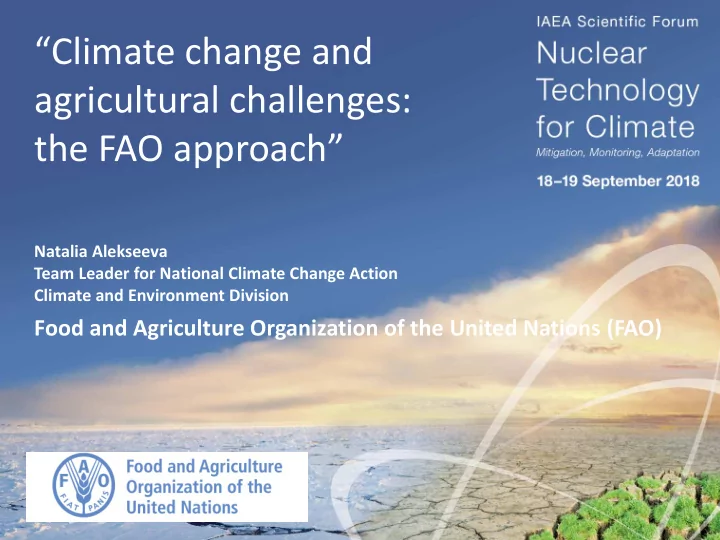

“Climate change and agricultural challenges: the FAO approach” Natalia Alekseeva Team Leader for National Climate Change Action Climate and Environment Division Food and Agriculture Organization of the United Nations (FAO)
Climate Change and Agriculture 2018 edition of “The State of Food Security and Nutrition in the World” • provides new evidence that beside conflicts, climate variability and extremes are also a key force behind the recent rise in global hunger. They are also one of the leading causes of severe food crises. The majority of people most vulnerable to climate shocks and natural hazards are the world’s 2.5 billion small-scale farmers, herders, fishers and forest-dependent communities, who derive their food and income from renewable natural resources.
FAO Climate Change Strategy Climate change links with the full spectrum of FAO’s work on hunger, • sustainability, poverty, agricultural and food systems, and resilience across all agricultural sectors and natural resources. The Strategy for FAOs work on Climate Change builds on FAO’s Strategic • Framework to strengthen the Organization’s work on climate change in the context of FAO’s international climate and sustainable development agenda. Strategy outcomes: • Enhanced capacities of countries providing of technical knowledge and expertise on climate change -> Building a unit for response to National Determined Contributions Improved integration of food security, agriculture, forestry and fisheries within the international climate change agenda Strengthened coordination and delivery of FAO work on climate change.
What do we do
Climate-Smart Agriculture (CSA) Climate-Smart Agriculture is an approach for developing agricultural strategies to secure food security under climate change. CSA aims to tackle three main objectives: (i) sustainably increase agricultural productivity and incomes; (ii) adapt and build resilience to climate change; and (iii)reduce and/or remove greenhouse gas emissions , where possible.
Nuclear Applications for CSA • Assessment/evaluation of: – Impact of climate change on agriculture – Impact of agricultural practices on climate change • Development of technologies for adaptation and building resilience to climate change • Improvement of agriculture practices for potential mitigation of climate change
Recommend
More recommend